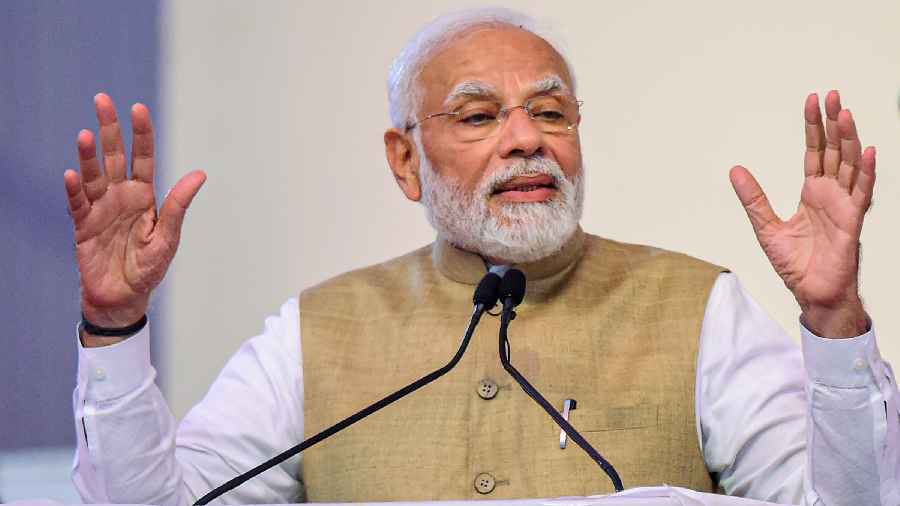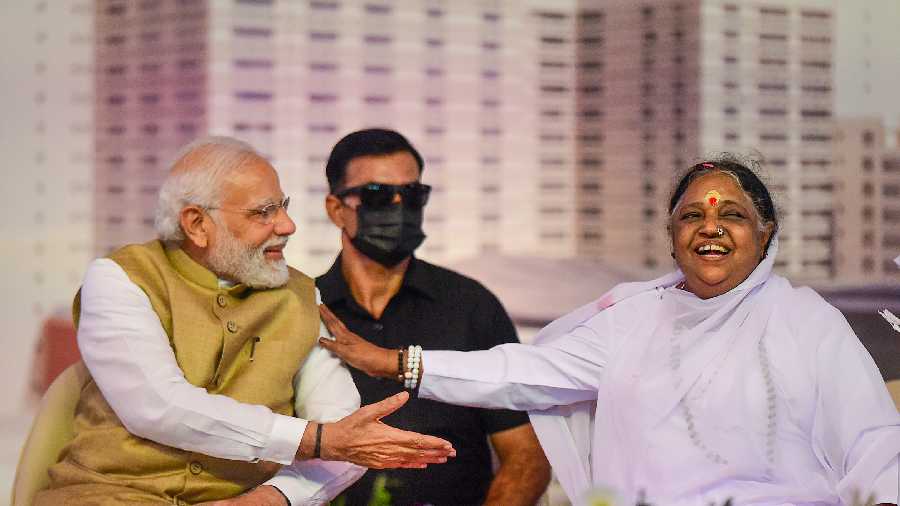Prime Minister Narendra Modi on Wednesday said healthcare and spirituality are closely linked in India and the country's COVID-19 vaccination drive got a big boost when religious leaders came forward to scotch rumours against vaccines.
Modi said this in his address inaugurating a 2,600-bed private hospital here.
Built at an estimated cost of around Rs 6,000 crore, Amrita Hospital is equipped with cutting-edge technology, including a centralised fully-automated laboratory.
"India is a country where healthcare and spirituality are closely linked. COVID-19 is an example of a successful spiritual-private partnership that helped create awareness and implement the world's largest vaccination drive," Modi said.
He said that when India made its vaccine against COVID, a "kind of propaganda was unleashed by some people".
"But, when religious leaders and spiritual teachers of the society came together and asked the people not to heed to such rumours, the effect was immediate. India did not face the kind of vaccine hesitancy as seen in other countries," the Prime Minister said.
India's COVID-19 vaccination coverage since the start of the exercise in January 2021 has crossed the 210-crore milestone for cumulative doses administered to beneficiaries.
Modi called the hospital a "fusion of 'Adhunikta' (modernity) and 'Adhyatmikta' (spirituality)."
He also heaped praise on spiritual leader Mata Amritanandamayi.
Mata Amritanandamayi, addressed as 'Amma' by her admirers, showered flower petals on Modi when he offered her a shawl and a garland as she blessed him.
Modi removed his footwear before bowing to 'Amma' and in his address also spoke a few lines in Malayalam, the native language of Kerala, where she hails from.
"Amma is the embodiment of love, compassion, service and sacrifice. She is the carrier of India's spiritual tradition," Modi said in Malayalam to the audience, which besides local residents, had many ambassadors of foreign countries.
"A combination of technology and modernisation will lead to the country's progress in the healthcare sector. India is endeavouring to ensure that governments and others come forward to transform the health and education sectors on a mission mode, he said.
The state-of-the-art Amrita Hospital, built on a sprawling 130-acre campus with sustainability in mind, has a dedicated seven-storey research block and has been constructed over a period of six years by the Mata Amritanandamayi Math.
In his speech, Modi also referred to the Amrit Kaal', a phrase that he and other BJP leaders have been frequently using of late in their addresses, and which is purported to mean by them the beginning of an era of bright future for India.
"A few days ago, the country entered the 'Amrit Kaal' with renewed energy. In this 'Amrit Kaal', the country's collective efforts are getting institutionalised, its collective thoughts are getting awakened. I am happy that in the first phase of this 'Amrit Kaal', the country is also getting the 'amrit' (elixir) of Mata Amritanandamayi's blessings," he said.
Haryana Governor Bandaru Dattatreya and Chief Minister Manohar Lal Khattar, his deputy Dushyant Chautala, and Union minister Krishan Pal Gurjar were also present at the event.
Earlier in the day, Modi arrived at the venue in a chopper, and after landing at a makeshift helipad on the campus, proceeded to light a ceremonial lamp with children chanting hymns in the background, in the atrium area, and was later shown the model of the hospital complex.
Modi later in his address underlined that India did not lose its civilisational essence despite a long period of slavery.
"And, India's spiritual vitality is being seen again, and the energy of ideals is getting stronger," he added.
Modi said even though the hospital has been built under a public-private partnership, he sees it as Paraspar Prayas or mutual effort.
Khattar in his address said: "Today, not just a hospital is being inaugurated, it is also a 'yagna' to serve the poor. The hospital will take the Centre's Swasth Bharat Mission forward."
The super-speciality hospital has opened with 500 beds and is expected to be fully operational in a phased manner over the next five years.
Once fully operational, the hospital with 81 specialities is billed to be the largest private hospital in Delhi-NCR and the country, its officials had earlier said.
The hospital buildings span 36 lakh square feet in built-up area, with a 14-floor tower housing key medical facilities such as a dedicated seven-storey research block and eight centres of excellence.
From creating specialised isolation rooms to ensuring nearly contactless conveying of blood and other samples to a centralised laboratory, several COVID-safety design elements have been incorporated in the hospital after "learning lessons" from the pandemic that had stalled the project.












